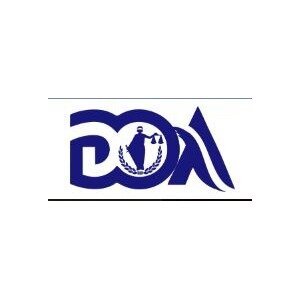Best Employer Lawyers in Ikoyi
Share your needs with us, get contacted by law firms.
Free. Takes 2 min.
List of the best lawyers in Ikoyi, Nigeria
Nigeria Employer Legal Articles
Browse our 1 legal article about Employer in Nigeria written by expert lawyers.
- Are Unwritten Employment Contracts Legally Valid and Enforceable in Nigeria?
- A contract of employment can exist whether orally or in writing. It can arise out of any discussion, obligation or instruction to do an act as far as the elements of a contract are present. Agreements are made to be honoured. An unwritten contract is enforceable provided it complies with... Read more →
About Employer Law in Ikoyi, Nigeria
Employer law in Ikoyi, Nigeria, forms an essential part of the broader employment law framework within the country. This area of law governs the relationship between employers and employees, focusing on workplace rights and responsibilities. The legal landscape is influenced by a combination of federal labor laws, such as the Labour Act, as well as specific state regulations. In Ikoyi, being a prominent business district within Lagos State, an understanding of both federal and state-specific employment laws is crucial for ensuring smooth and legally compliant employer-employee relations. This legal framework aims to balance the rights of workers with the needs of employers, providing guidance on matters such as employment contracts, workplace safety, and termination procedures.
Why You May Need a Lawyer
There are several scenarios where obtaining legal assistance in employer-related matters in Ikoyi could be beneficial. Firstly, businesses may seek legal advice when drafting employment contracts or company policies to ensure compliance with Nigerian law. Employers might also require representation or guidance in settling disputes with employees, which could range from wrongful termination cases to allegations of workplace discrimination or harassment. Additionally, changes in laws or regulations may warrant a review of existing employment practices, necessitating expert legal guidance. Finally, during mergers, acquisitions, or restructuring, employers should consult with lawyers to understand and mitigate the potential impacts on their workforce.
Local Laws Overview
The legal framework governing employer relations in Ikoyi, Lagos State, is primarily based on federal law, with the Labour Act serving as the cornerstone. Key aspects include:
- Employment Contracts: Must clearly outline terms of employment, including job description, salary, and termination conditions.
- Minimum Wage: Employers are required to adhere to the national minimum wage standards, ensuring no employee earns below the set threshold.
- Working Conditions: Laws stipulate maximum working hours, rest periods, and overtime compensation to protect employee welfare.
- Termination Procedures: Legal guidelines exist to provide fair procedures for dismissals, including proper notice and justified reasons.
- Workplace Safety and Health: Employers must comply with health and safety regulations to provide a safe working environment.
Frequently Asked Questions
What is the minimum wage for employees in Ikoyi, Nigeria?
The national minimum wage is set by the federal government and applies across all states, including Lagos. As of the latest update, employers must pay at least the national minimum wage, but local variations can occur.
How are disputes between employers and employees typically resolved?
Disputes are often resolved through negotiation or mediation. If these methods fail, cases may be taken to the National Industrial Court of Nigeria, which specializes in labor disputes.
Is it mandatory for employers to provide a written contract of employment?
Yes, under Nigerian law, it is mandatory for employers to provide employees with a written contract outlining the terms and conditions of employment.
What are the legal requirements for terminating an employee?
Employers must provide adequate notice as stipulated in the employment contract and comply with statutory requirements. Dismissals must be for fair and lawful reasons.
Are there specific laws regarding employee safety in the workplace?
Yes, employers are required to adhere to occupational safety and health standards to ensure a safe work environment, minimizing risks of injuries or health hazards.
Do employers need to pay severance to employees in Ikoyi?
Severance pay is typically subject to the terms outlined in the employment contract unless otherwise required by law, such as in cases of redundancy or unfair dismissal.
Can an employer change the terms of an employment contract unilaterally?
No, any changes to the terms of an employment contract must usually be agreed upon by both parties, unless a clause in the contract allows for specific unilateral changes.
How can an employer ensure they are compliant with employment laws?
Employers should regularly review legal updates, consult with legal experts, and potentially seek audits of their employment practices to ensure compliance.
What role do labor unions play in Ikoyi?
Labor unions represent employee interests, negotiating for better wages and working conditions. Employers may need to engage with unions in certain industries or work environments.
Are there specific laws regarding discrimination in the workplace?
Yes, Nigerian law prohibits discrimination based on various factors, including race, gender, age, and religion, and employers must adhere to these standards.
Additional Resources
For those seeking further guidance, the following resources can be helpful:
- Nigeria Labour Congress: Provides information and support regarding labor rights and policies.
- Federal Ministry of Labour and Employment: Offers resources and guidance relating to employment laws and practices.
- Lagos State Ministry of Commerce, Industry & Cooperatives: Can provide local support and information for employers based in Lagos State.
- National Industrial Court of Nigeria: For information on the judicial process relating to labor disputes.
Next Steps
If you require legal assistance in employer matters, consider the following steps:
- Consult with a specialized employment lawyer to discuss your specific needs or concerns.
- If you are involved in a dispute, consider alternative dispute resolution methods such as mediation before pursuing formal legal action.
- Keep informed about any changes in employment law that may affect your business or employment practices.
- Engage with professional organizations or industry bodies that offer legal resources and support.
Pursuing proper legal advice will help ensure that your employer-employee relationships are compliant and fair, minimizing risks and fostering a healthy workplace environment.
Lawzana helps you find the best lawyers and law firms in Ikoyi through a curated and pre-screened list of qualified legal professionals. Our platform offers rankings and detailed profiles of attorneys and law firms, allowing you to compare based on practice areas, including Employer, experience, and client feedback.
Each profile includes a description of the firm's areas of practice, client reviews, team members and partners, year of establishment, spoken languages, office locations, contact information, social media presence, and any published articles or resources. Most firms on our platform speak English and are experienced in both local and international legal matters.
Get a quote from top-rated law firms in Ikoyi, Nigeria — quickly, securely, and without unnecessary hassle.
Disclaimer:
The information provided on this page is for general informational purposes only and does not constitute legal advice. While we strive to ensure the accuracy and relevance of the content, legal information may change over time, and interpretations of the law can vary. You should always consult with a qualified legal professional for advice specific to your situation.
We disclaim all liability for actions taken or not taken based on the content of this page. If you believe any information is incorrect or outdated, please contact us, and we will review and update it where appropriate.










